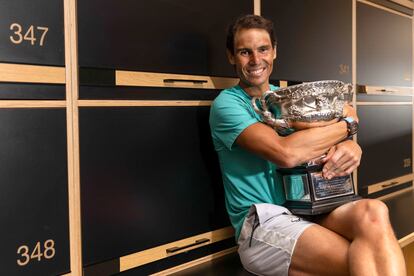Rafa Nadal stakes further claim to GOAT title after epic Melbourne comeback
The Spaniard became the first male player to overturn a two-set deficit in the final of the Australian Open as he defeated Daniil Medvedev in five sets to move to 21 Grand Slam victories

Circle the date in history, with a golden pen: January 30, 2022, the day when Rafa Nadal beat a pure guerilla by the name of Daniil Medvedev at the Australian Open in five hours and 24 minutes (2-6, 6-7, 6-4, 6-4, 7-5) to ascend to the highest of altars and claim a 21st Grand Slam victory after being sidelined by injury and Covid-19 heading into the tournament at Melbourne Park. For the first time in the extraordinary career of the Spanish player, Roger Federer and Novak Djokovic, his intrepid colleagues in the GOAT debate, are in Nadal’s rear-view mirror. The Mallorcan’s victory in Melbourne was his second following his triumph at the 2009 Australian Open and it was 1.10am when Medvedev, the unofficial leader of the next gen of tennis, finally threw up the white flag. Nadal hoofed a ball with a foot, fell to his knees and was enveloped by his team in triumph.
Nadal’s ascent to the podium in his personal tussle with Federer and Djokovic to add the elusive 21st major to his laurels lends itself to more than a hint of romanticism. The Swiss great missed his chance at Wimbledon three years ago and Medvedev denied Djokovic at the US Open in September. The Australian Open was set up for a Nadal fairytale, the Spaniard arriving in Melbourne on the heels of Federer and Djokovic in the race for the coveted 21st major and plagued by a foot injury that had sidelined the world number five for the best part of six months. Nadal had even toyed with retirement before the Australian Open, the constant battle with his own body leading the old warrior to consider calling it a day, but he boarded the plane to Melbourne and on Sunday knocked off a player 10 years his junior, the most viable pretender to the throne of the big three.
It is a testament to Nadal’s fortitude, his experience and his power of resistance. At the age of 35, Nadal – now the most decorated player of all time in the men’s game and only behind Margaret Court (24), Serena Williams (23) and Steffi Graf (22) overall – Nadal overcame the coup attempt launched by the 25-year-old Medvedev. Time passes, but the Spaniard continues to throw his punches as though he was playing his first tournament. No player had overturned a 0-2 deficit at Melbourne Park since Roy Emerson against Fred Stolle in 1965.
Both players set out their stalls early, a declaration of intent with knives drawn from the outset. Nadal replied to the Russian’s serve from a position practically on the back-court, seeking high returns and looking to slice short backhand shots to knock Medvedev off-balance and hit the angles with a forehand or backhand winner. Nadal’s goal was to open the court as much as possible, a risky strategy: Medvedev, one of the best counter-hitters on tour, is more than comfortable on the baseline and happy to build points patiently, hitting his shots flat and obliging his opponent onto the back foot, hitting deep returns. It is how Machiavelli would have played the game.
Medvedev managed to nullify Nadal in the opening set and guide the course of the game to where he wanted it. Everything happened quickly, but at the same time slowly. That is the Russian’s curious style: he seems to neither feel nor suffer, but inside a volcano is erupting. He is a leviathan on a par with Nadal, putting the Spaniard in a position of permanent discomfort. Nadal was pouring with sweat after just two games, forced to the extremes of endurance on every point. Physically, it was brutal. Mentally, also. Medvedev pushed and pushed, covering the court in three or four strides but finding not one chink in Nadal’s armor.
The Russian also has few weaknesses. Nadal fell back on a couple of defensive volleys and doused the Russian’s flame with another into open court. But he could not prevent the Russian from inflicting a love returning game, Medvedev capitalizing on his ascendancy to force a tie-break in the second.
While Medvedev’s Next Gen peers tend to wilt under serious examination, the Russian grows in the fray. Nadal launched an offensive in the second set that Medvedev was able to fend off, breaking in the fourth and eighth games. When Nadal threatened to turn the tide, Medvedev was ready: as he had against Djokovic in the US Open final last September, after an hour and a half in the second, he slipped the Spaniard’s trap.
Nadal called on hi considerable armory but his serve deserted him and he left the door open too often with unforced errors. How to respond? Nadal did not back down but the US Open champion stepped up, racking up a two-set lead. Nadal’s trusty survival booklet seemed redundant.
Whatever Nadal attempted, the 2009 champion met with resistance. Short rallies went Medvedev’s way and long ones – Nadal’s go-to to pummel opponents into submission – failed to make a dent. Half chances went begging. However, Nadal turned the tide. He fought back. He failed to buckle. When on the ropes, the Spaniard tends to come out swinging and he saved break points at 3-2 in the third and then counter-attacked. At 4-4 he broke and Medvedev’s purgatory began: Nadal forces opponents to play several games within a game. Getting the better of the Spaniard is like doing a Rubik’s cube one handed while driving a mountain road.
Break point opportunities went both ways in the fourth, 15 in total, Nadal converting two to force a fifth set. Nadal broke in the fifth game of the decider, and although he required two service games to finish the job, Medvedev had been reminded first-hand that you never give up a game against Nadal, even at 2-0 to the good.
Rod Laver Arena- no huge backer of the pretender – rose to its feet in delight.
The Russian had lambasted the umpire in his semi-final victory over Stefanos Tsitsipas and was again vocal in his displeasure about the partisan support afforded to Nadal, but when the dust had settled, the Spaniard stood alone as the only male player to break the 20-major barrier in the history of the sport. For now, yet again, the Next Gen remain exactly that.
Tu suscripción se está usando en otro dispositivo
¿Quieres añadir otro usuario a tu suscripción?
Si continúas leyendo en este dispositivo, no se podrá leer en el otro.
FlechaTu suscripción se está usando en otro dispositivo y solo puedes acceder a EL PAÍS desde un dispositivo a la vez.
Si quieres compartir tu cuenta, cambia tu suscripción a la modalidad Premium, así podrás añadir otro usuario. Cada uno accederá con su propia cuenta de email, lo que os permitirá personalizar vuestra experiencia en EL PAÍS.
¿Tienes una suscripción de empresa? Accede aquí para contratar más cuentas.
En el caso de no saber quién está usando tu cuenta, te recomendamos cambiar tu contraseña aquí.
Si decides continuar compartiendo tu cuenta, este mensaje se mostrará en tu dispositivo y en el de la otra persona que está usando tu cuenta de forma indefinida, afectando a tu experiencia de lectura. Puedes consultar aquí los términos y condiciones de la suscripción digital.









































